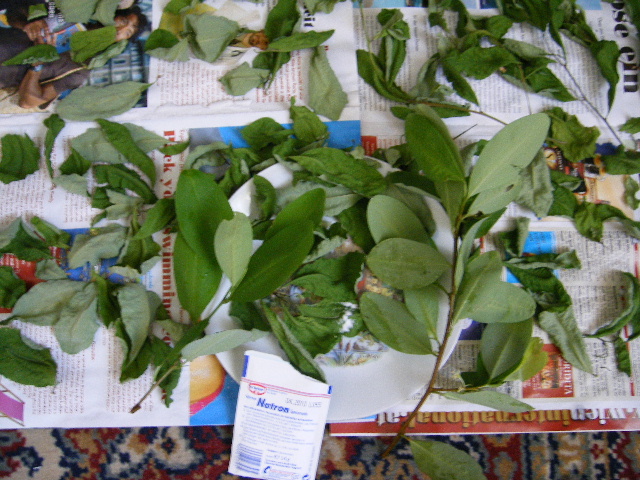

GreenAcres
Members2-
Content count
10 -
Joined
-
Last visited
About GreenAcres
-
Rank
Day Tripper
Previous Fields
-
Climate or location
Australia Zone 4
Recent Profile Visitors
The recent visitors block is disabled and is not being shown to other users.
-

New Herb Shop in Byron Bay - Grand Opening party
GreenAcres replied to Torsten's topic in News & Notices
Is there a phone number? -
I have made it using multiple different sources and it certainly has some effect; I prefer celtic sea salt it seems to have a more all over body effect, whereas himalayan is more in the head. It seems to act synergystically with some substances, however I have almost stopped drinking alcohol after taking it because it doesn't seem to agree with it/me, herbs seem to respond well however. I get a similar feeling of allover wellness as I did when taking an extract of the roots of polygonum multiflorum, only quicker acting and maybe less broad spectrum. It has helped with my mother in laws psoriasis with a dramatic reduction and she hasn't changed anything else in her diet or otherwise. She takes it every day morning/evening for 2 weeks and then has a week off and loves it. I have taken it a limited number of times and only take it when I feel like it, although after taking it for 3 days straight a month or 2 ago I did seem to get great relief from my scoleosis until about a week ago. Anyway this is just one random persons anecdotal report and I presume it will be taken as such but I believe there is something to it.
-
Saw this and thought it was interesting considering the source. Link: http://www.economist.com/world/internation...ory_id=14845095 Drugs Virtually legal Nov 12th 2009 From The Economist print edition In many countries, full jails, stretched budgets and a general weariness with the war on drugs have made prohibition harder to enforce Alamy THE Green Relief “natural health clinic” in a bohemian part of San Francisco doesn’t sound like an ordinary doctor’s surgery. For those who wonder about the sort of relief provided, its logo—a cannabis leaf—is a clue. Inside, in under an hour and for $99, patients can get a doctor’s letter allowing them to smoke marijuana in California with no fear of prosecution. In a state that pioneered bans on smoking tobacco, smoking cannabis is now easier than almost anywhere in the world. California, with its network of pot-friendly physicians, offers the most visible evidence of a tentative worldwide shift towards a more liberal policy on drugs. Although most countries remain bound by a trio of United Nations conventions that prohibit the sale and possession of narcotics, laws are increasingly being bent or ignored. That is true even in the United States, where the Obama administration has announced that registered cannabis dispensaries will no longer be raided by federal authorities. Click here From heroin “shooting galleries” in Vancouver to Mexico’s decriminalisation of personal possession of drugs, the Americas are suddenly looking more permissive. Meanwhile in Europe, where drugs policy is generally less stringent, seven countries have decriminalised drug possession, and the rest are increasingly ignoring their supposedly harsh regimes. Is the “war on drugs” becoming a fiction? Reformers are in a bold mood. Earlier this year a report by ex-presidents of Brazil, Colombia and Mexico called for alternatives to prohibition. On November 12th a British think-tank, Transform, launched a report* setting out ideas on how drugs could be legally regulated. For every substance from cannabis to crack, it suggests a form of regulation, via doctors’ prescriptions, pharmacy sales or consumption on licensed premises. That world is still some way off. But a debate about regulation is increasingly drowning out the one about enforcement. Take America, where 13 states let people smoke marijuana for medical reasons. Most set somewhat stricter terms than California—where insomnia, migraines and post-traumatic stress can all be reasons for a spliff, if you see the right doctor. “There’s never been a person born who couldn’t qualify,” says Keith Stroup, the founder of the National Organisation for the Reform of Marijuana Laws, a lobby group that has been around since 1970. “In California, the system of medical use they have adopted is in fact a version of legalisation.” Elsewhere in the United States, there are many signs of prohibition ebbing away. Some 14 states have decriminalised the possession of marijuana for personal use (medical or otherwise), though most keep the option of a $100 civil penalty. Three states—New Mexico, Rhode Island and Massachusetts—license non-profit corporations to grow medical marijuana. Most radically, some states are considering legalising the drug completely. California and Massachusetts are holding committee hearings on bills to legalise pot outright; Oregon is expected to introduce such a bill within the next couple of weeks. One reason for the sudden popularity of cannabis is financial. Tom Ammiano, the California assemblyman who introduced the bill to legalise marijuana earlier this year, points out that were it taxed it could raise some $1.3 billion a year for state coffers, based on a $50 per ounce levy on sales. As an added benefit to the public purse, lots of police time and prison space would be freed up. California’s jails heave with 170,000 inmates, almost a fifth of them inside for drug-related crimes, albeit mostly worse than just possessing a spliff. In Europe, the authorities face similar pressures: the difficulty of enforcement, and bursting courts and prisons. So the tough sentences recommended in the laws of many European countries are seldom handed out. London’s police chief said last week that law-breakers of all kinds were escaping with cautions or on-the-spot fines, because of pressure on the courts. Though many European countries still have prison as an option for convicted drug users, in reality only a fraction end up in jail, according to new research from the European Monitoring Centre for Drugs and Drug Addiction, the EU’s drug agency (see chart). What is more, the sentences are shorter in reality than politicians like to pretend. In Denmark the top sentence for a standard drug offence was recently raised from six to ten years, but the average time actually served is 20 months. More startling is Britain, where possession of cannabis can, in theory, result in a five-year prison term. In fact just 0.2% of people found in possession of pot go to jail; most of the rest get off with a warning. The few who go behind bars—usually serial offenders, or suspected dealers—do an average of three months. Europe’s lenient lands Elsewhere in Europe, the law itself is softer. Personal possession of any drug—even the hardest—is not a crime in Spain, Portugal, Italy, the Czech Republic or the Baltic states. Some German states and Swiss cantons take the same line. Portugal is especially liberal: rather than fining users or punishing them in other ways (such as removing their driving licences), it usually just impounds their stash and sends them on a course of treatment and dissuasion. Since it began in 2001, the policy has led to a rise in the number of people seeking treatment but no apparent increase in use. Experiments like these seem to have been noted in the White House. Barack Obama’s drug tsar, Gil Kerlikowske, has been at pains to distance himself from talk of legalisation of cannabis, or any other drug. (Legalising pot is a “non-starter”, he said on October 23rd.) But it is clear that the election of Mr Obama, who in the past has called the war on drugs an “utter failure”, has affected policy both in the United States and elsewhere in the Americas. Under the Bush administration, cannabis dispensaries were shut down, regardless of the laws of the state in which they operated. The new political climate in Washington, DC, has made it easier for Canada to take a more liberal line on cannabis. In British Columbia, harder drugs are treated in innovative ways too: heroin addicts can get their doses on prescription, and take them in supervised conditions. Farther south, the results of Mr Obama’s election seem dramatic. In August, Mexico decriminalised the possession of small amounts of any drug—from cannabis to crack—in a bid to free its federal agents to focus on bringing traffickers to justice. It had tried to do so in 2006, but howls of protest from the Bush administration halted the move at the eleventh hour. In August, Argentina’s supreme court said it was unconstitutional to prosecute people for drug possession. The following month, Colombia’s supreme court issued a similar ruling. Now, Brazil and Ecuador are said to be mulling decriminalisation. It remains to be seen whether these moves will help stem the bloodshed that has engulfed the region. In Ciudad Juárez, a Mexican border town ravaged by trafficking wars, some 2,000 people have been murdered this year, making it one of the riskiest places on earth. Decriminalising personal possession, though helpful in other ways, won’t do much to tackle organised crime, which retains its grip on the market. But America’s tentative moves in the direction of legalising the supply of drugs, rather than just going easy on users, could start to change things. Sanho Tree, of the Institute for Policy Studies, an American think-tank, notes that Mexico’s cartels are thought to get about 70% of their income from sending marijuana north. The higher the legal production, the harder that will be. If California’s hippies long for legalisation, the bullet-weary citizens of Mexico’s poorest barrios are even keener. * “After The War On Drugs: Blueprint For Regulation”, from Transform Drugs Policy Foundation.
-
This short film is one that I find very interesting. It is made by a group of friends in Humboldt about 30 years ago. http://www.dailymotion.com/video/xn7e_marijuana-man_fun
-

EGA- Bear Owsley Headlining - FRI 6-MON 9 NOV - Last Tix
GreenAcres replied to RonnySimulacrum's topic in News & Notices
Thanks to the people who posted the audio and pictures. I wish I was there but will be looking forward to next year. -
-
haha, yeah that was pretty funny. I was hoping he would keep chewing it for a bit though.
